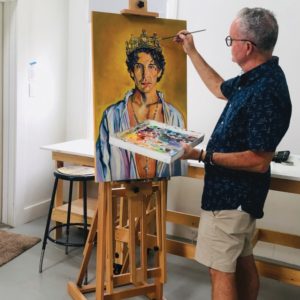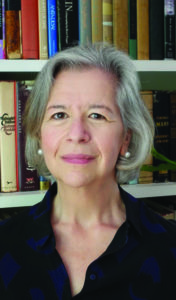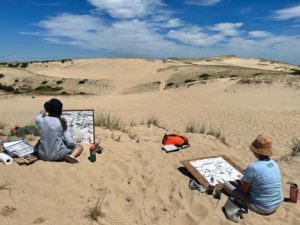PROVINCETOWN — Every summer the Fine Arts Work Center welcomes people from around the world to its visual art, photography, and writing workshops. Topics range from “The Intimate Portrait,” taught by Jess Dugan, to “Luminous Wreckage: Writing Your Way Back Into Being,” taught by Tina Chang.
Students and teachers alike come year after year for these workshops, most of which are limited to 10 participants. They fill up quickly. The Independent asked three longtime participants what brings them back.
Daniel Roemmelt
Daniel Roemmelt was an art teacher for 33 years. Now he’s a student.

A fine arts major, he taught courses in drawing, painting, and theater, as well as an Advanced Placement art history course, at Bath Central High School in upstate New York. He didn’t have much time to himself.
“It had kind of been on hold for my whole career, amazingly,” Roemmelt said of his own art. “As a teacher, you don’t have time to do your own work.”
He began painting again when he retired and moved to Fort Lauderdale in 2019. That same year he came to the Fine Arts Work Center in Provincetown. He had been to Provincetown only once before, in 1990.
The classes at FAWC were a far cry from his days at Hartford Arts School, where instructors taught “This is how I paint, this is how you’re going to paint.”
FAWC instructor Michael Prodanou gave Roemmelt a spatula to paint with, because he was using too many small brushes. “You get into a rut,” he said. “To have to do something that isn’t in your comfort zone is really good.”
Roemmelt was so captivated by his Provincetown experience that year that he came back in 2020 and 2021 even though the pandemic had shut down FAWC’s classes.
“It feeds my energy in ways that I cannot explain,” he said of the town. This summer he’s here for two months, twice as long as he usually stays.
“There’s just an incredible freedom,” he said.
Last week, in the “Painting the Figure” workshop taught by Forrest Williams, Roemmelt explored a familiar subject through a new lens. He was challenged to paint figures from further away than he’s used to, forcing him to consider the backdrop for his paintings.
Joan Wickersham
Joan Wickersham is astonished that she lived in Cambridge for 30 years before finding her way to Provincetown in 2011, when Richard McCann, a longtime teacher at the Fine Arts Work Center, fell ill and asked Wickersham to cover his class that summer. McCann had read Wickersham’s book The Suicide Index and had invited her to speak in his writing class at American University in 2010.

Though Wickersham was an outsider, she immediately felt at home. She described how a friend of Richard’s, the poet Marie Howe, took her out to breakfast and showed her the ropes at FAWC.
“I had the sense of wandering into a place that had a lot of history,” Wickersham said. “And that it wasn’t just old history, it was continuous history and overlapping history.”
Wickersham has been back every year since, teaching one or two workshops each summer. This year she taught “Jump Starts for Cold Mornings,” a course “right at the boundary between fiction and memoir — you almost can’t quite tell which it is.”
The course is designed “to help people get moving again” when they feel sluggish, which she said has been a common effect of the pandemic. “It’s about giving people prompts that they can use next February when they’re stuck,” she said.
Wickersham fosters deep connections with her students, who range in age and experience. Some students come every year; others return after taking years off. She has students who use her course as a reunion space, with friends flying from across the country every summer to gather and write. She’s helped students work on the same piece several years in a row.
“It’s fun to watch people that you know from different years meet each other,” Wickersham said, “to see the combinations and recombinations.”
Wickersham described meeting the photographer Adam Davies at FAWC several years ago and then partnering with him to create a series of poems and photographs that was displayed in an online exhibition at Scandinavia House in New York in 2021.
“Something about this place is very stimulating,” Wickersham said. “You never know who you’re going to meet.”
FAWC lacks the snooty, competitive feeling of some other writing programs, Wickersham said. “I think people go away from this place feeling good about their work in general,” she said. “But not in a sappy, nondiscriminating, ‘you’re fabulous’ kind of way.”
Beth Delagi
When Beth Delagi first heard about the Fine Arts Work Center in 2009, she thought there was no chance it could work out for her. With five kids ranging in age from 5 to 19 all living at home in Houston, Delagi was not about to jet off to Provincetown for a week.

But the idea stuck in her mind. “I just remember thinking: that sounds amazing to be able to leave everything — responsibility, kids, spouse — and just escape,” she said.
Art had always been a part of her life, Delagi said, starting with a childhood habit of drawing.
That evolved into sewing clothes and quilting, and later photography, inspired “by the dog Instagram world,” she said.
In 2012, Delagi got her chance when her youngest went off to sleepaway camp. “Everyone was in their places, so Mom could do something for herself,” she said.
She took her first class at FAWC with her sister, Sarah Winthrop, that summer. The photography course was taught by Joanne Dugan, who still teaches at FAWC. The connection, Delagi said, was immediate.
“We fell in love with the place,” she said. “Fell in love with the FAWC, Provincetown, the people, the feeling, the camaraderie, the community. Everything.”
Delagi has taken at least one photography class with her sister every summer since. One workshop with David Hilliard was particularly memorable.
“Everyone fell in love,” Delagi said, describing the bond among the 10 students. “It was crazy to bond like that and feel the connection. It’s got to be the FAWC that fostered that.”
In 2021, Delagi took a remote drawing class with a friend (FAWC did not offer in-person classes that year). The instructor wanted 100 drawings from each participant by the end of the week.
“All we did was draw,” Delagi said. “We were exhausted at the end — but exhilarated.”
That inspired Delagi and three friends to embark on a 100-day drawing project that fall, with the drawings posted online.
“I need a goal,” she said. That’s what FAWC provides.
Delagi is back this week for another course with Joanne Dugan. This one is titled “Owning Your Truth: More Experiments In Text and Image.”
“There’s such a strong sense of community in Provincetown, at FAWC,” Delagi said. “Why would you want to be anywhere else?”



